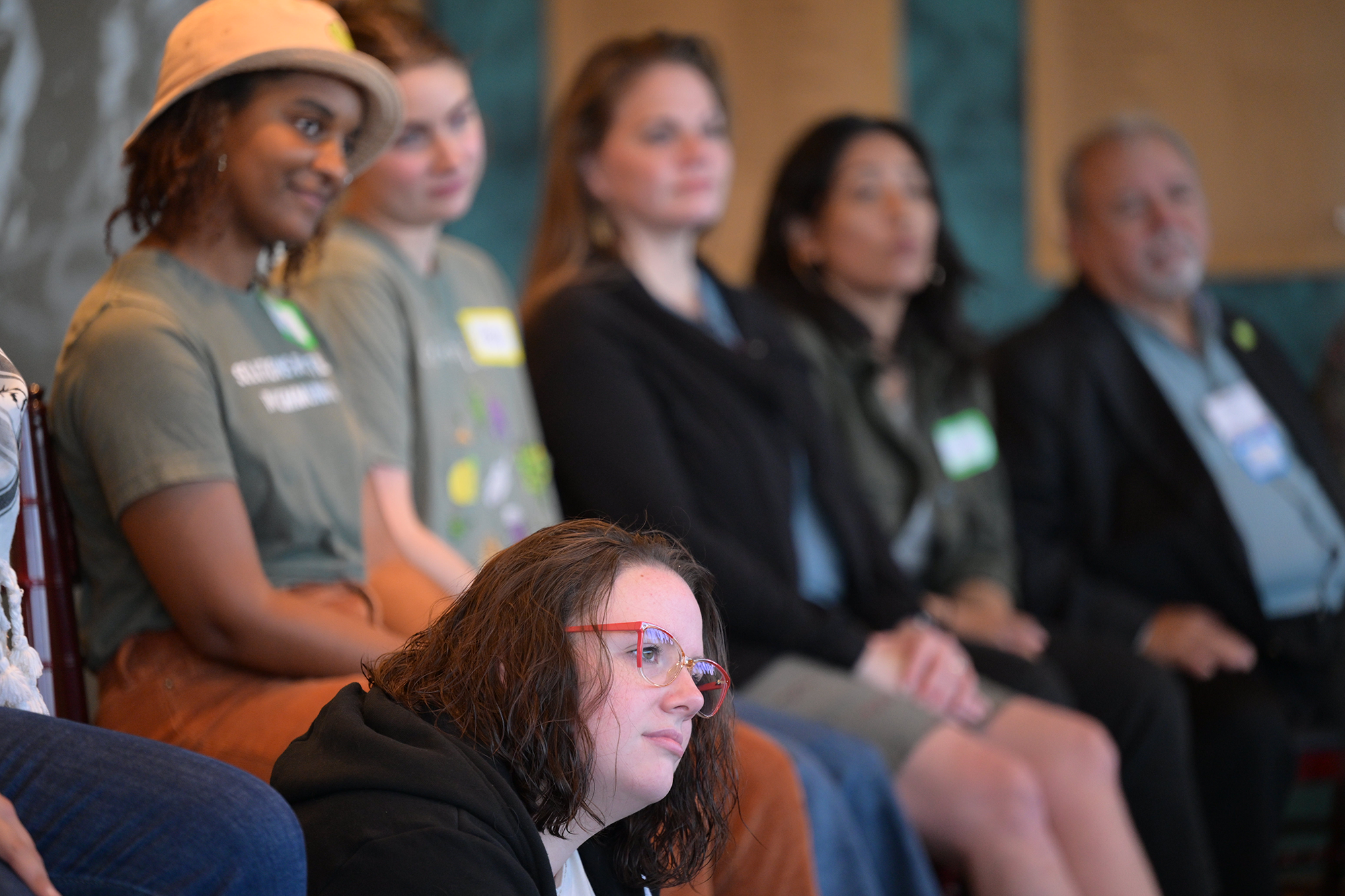
In this week’s issue of the Principle 6 Newsletter, republished below, Mike Mercer explores the role credit unions and other cooperatives could play in helping their members understand the principles of democracy and good citizenship—especially during a time when many people are anxious about the stability of American democracy.
“It could be that the concerns about American government and the stability of democracy provide an opportunity for U.S. co-ops to step forward in a helpful, non-divisive way. And, in the process, illustrate the uniqueness of their democratic structures,” Mercer says.
Read the full issue of Principle 6 Newsletter below. And while you’re thinking about “cooperation among cooperatives,” take a moment to consider how you and your cooperative practice this principle. NCBA CLUSA is on a mission to document Principle 6 collaborations across the country so we can identify trends, document best practices and share this knowledge with you—our fellow cooperators!
Share your example of Principle 6
Principle 6 Newsletter – Whither Democracy?
Issue 13 – January 13, 2021
“I can’t say this any more clearly: Our democracy is in terrible danger—more danger than it has been since the Civil War, more danger than after Pearl Harbor, more danger than during the Cuban missile crisis and more danger than during Watergate.” – Thomas Friedman, The Palm Beach Post, 9-30-20
“Most Americans never imagined they would see such banana-republic images of violence from the seat of American democracy.” – Dana Milbank, Washington Post, 1-6-21
“…Today a final line was crossed that I will no more excuse.” – Jim Nussle, Twitter Post, 1-6-21
 The storming of the U.S. Capitol was a shocking wake-up call for American citizens. Democracy is fragile. Even here. It has been said that democracy depends on things like commonality of purpose…shared identity…aligned values…self-initiative…educated electorate…basic security…economic opportunity…transparency…rule of law…and, ultimate authority vested in the people. Autocracy is more efficient. It can get by with fear, propaganda and a loyal army. Appealing to more than a few citizens, apparently. American democracy can bend, but it will not easily break. Trust needs some mending now. Fair justice needs more attention… lots more. Wall Street up, Main Street struggling. Trying times.
The storming of the U.S. Capitol was a shocking wake-up call for American citizens. Democracy is fragile. Even here. It has been said that democracy depends on things like commonality of purpose…shared identity…aligned values…self-initiative…educated electorate…basic security…economic opportunity…transparency…rule of law…and, ultimate authority vested in the people. Autocracy is more efficient. It can get by with fear, propaganda and a loyal army. Appealing to more than a few citizens, apparently. American democracy can bend, but it will not easily break. Trust needs some mending now. Fair justice needs more attention… lots more. Wall Street up, Main Street struggling. Trying times.
What does all this have to do with co-ops… with credit unions?
Not much, many will say. Co-ops are value-creating organizations that should stick to their knitting… bringing workers together, providing electric power, facilitating group buying, providing financial services and the like. That’s it. Can’t be taking sides in divisive politics. In some states, can’t even take sides in a college football game! Co-ops should be politically neutral, issue antiseptic… hitting the KPIs. A struggle between right-left or democracy-autocracy… that’s somebody else’s lane.
In many ways, it would be nice if the controversial issues of society could just be walled off. But credit unions touch the lives of more than 100 million people who are dealing with the street-level implications of American government. Collectively, co-ops in other sectors may touch a similar number. All co-ops are dedicated fundamentally to improving the well-being of those people. It is unlikely that co-ops can just pull down a shade on their members’ anxieties with government or social injustice.
The growing concerns about the stability of American democracy should generate a few questions inside the credit union/co-op boardroom…
DO WE WALK OUR TALK?
Co-ops are among the most democratic of human collaborations. Each member has equal influence… at credit unions, one vote per member. These members elect a board of directors to represent them… so, to be accurate, co-ops are representative democracies. But, as co-ops grow, each member’s influence shrinks to the level of inconsequential. Many don’t bother voting… and most of them no longer realize that their co-op is even a democratically structured organization.
Detached members can become regarded as present-generation ‘renters’ of co-op service capabilities. Not owners. Communications promote what the co-op offers and the related benefits, not so much about why the co-op is ‘wired’ to provide those benefits. Consumers don’t care, it is said. Notwithstanding, the majority of co-op leaders truly believe that democratic ownership makes a difference. It fundamentally enables the institution to treat its members as though they were truly owners. It creates legitimate competitive advantage because the institution can really care about member well-being. Do we walk that democratic talk? Could we walk it better?
IS INSTITUTIONAL DEMOCRACY REALLY A GOOD THING?
Co-ops will not walk any talk if their leadership doesn’t believe that economic democracy is a worthy foundation for generating real value. A credit union CEO once said that the best form of credit union governance was “benevolent dictatorship.” No need to consult or much consider the opinions of members. Another proclaimed that a credit union was just a tax-advantaged community bank. In essence, members were merely factors of production in a growth-focused enterprise.
Fortunately, to most, the democratic structure of co-ops is intentionally distinct from businesses controlled by disproportionate capital holders. The co-op structure creates the conditions for economic justice, personal dignity and benefits distributed according to usage of co-op services. To the majority, the cooperative structure provides the highest degree of institutional assurance that those of modest means will not be left behind… that they will not be turned away because their present circumstances do not enable them to contribute sufficient profit to the firm. For these reasons and others, the democracy of co-op structure is regarded as being essential… worthy of intentional reinforcement.
HOW SHOULD WE DEMONSTRATE OUR DEMOCRATIC DIFFERENCE?
There is a credit union in the northeast that spends $50,000 a year on encouraging active member participation in board elections. A higher than usual percentage of members actually vote. They are provided with thorough candidate information to support contested elections. Board turnover is higher than most. Why? The credit union leadership believes that its democratic practices provide the credit union with sustainable competitive advantage.
There is another large credit union in the southeast that supports a local advisory committee around each of its numerous branches. The committee works with the local branch manager and they make some local decisions about branch operations and serve as an accessible feedback mechanism for members. The credit union doesn’t have to do this (most wouldn’t think of doing it), but they believe that it reinforces their uniqueness as a democratically controlled cooperative.
These are just two examples. There are an unlimited number of possibilities. The important thing is to ask the question, “How can we demonstrate our democratic difference?” Because of the anxiety surrounding American government, now is certainly a good time to revisit that question.
OUR MEMBERS WANT GOOD GOVERNMENT—CAN/SHOULD WE HELP THEM?
This is a leap for many. It is a step beyond what’s necessary for growing the firm. This question implies heavy focus on “what’s good for the member?” There may be payoff to the credit union but it will be difficult to measure. The question is not about taking sides… rather, it suggests helping members make informed decisions about their contributions to democracy. And, to a degree, helping them temper their anxieties by characterizing the issues/candidates in ways that inform without demonizing.
Co-ops have an opportunity to illustrate their democratic foundations by helping members consider their options about the exercise of citizenship. Cooperative principle #5 centers around education, training and information. Helping members understand the principles of good government and good citizenship could be an effective way to convey the importance (to them) of the democratic foundation of their co-op.
COULD WE COLLABORATE WITH OTHER CO-OPS TO ACHIEVE ‘CATEGORY DIFFERENTIATION’?
Much of the work involved with illustrating constructive democracy is outside the normal course of daily duty. Left inside the walls, this would likely be delegated to somebody without the authority (or resources) to be effective or to sustain. Perhaps a way to give sustainable life to this work would be to form a collaboration among co-ops at the local or regional level. Imagine the enhanced visibility of an initiative to elevate awareness of the democratic cooperative difference presented by all co-ops in the area.
This could be accomplished by claiming the high ground in helping local citizens become more effective in their exercise of local, state and federal citizenship. Working together, credit unions and other co-ops could be a go-to place for trustable learning. Perhaps this co-op group could team up with the local media to help them increase reach and effectiveness. It could be mutually beneficial if the reporters and editors (often just a few) could come to know and appreciate the co-op model as a solution for many of the local issues facing the community.
Credit unions have stepped forward in the past…to address issues of gender, racial and economic injustice. They have illustrated their institutional propensity toward inclusiveness and fairness in the process. It could be that the concerns about American government and the stability of democracy provide an opportunity for U.S. co-ops to step forward in a helpful, non-divisive way. And, in the process, illustrate the uniqueness of their democratic structures.
Whither democracy?
Stay tuned,
Mike


